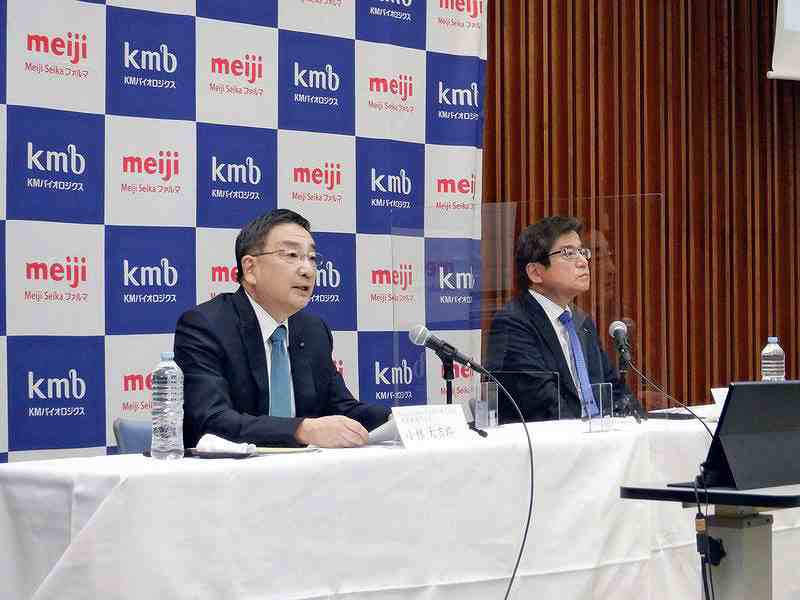
Officials of KM Biologics Co. give a press conference in Tokyo on Oct. 25.
November 6, 2021
Rapid progress in the clinical trials of domestically produced COVID-19 vaccines edges Japan closer to the approval and rollout of homemade inoculations, with pharmaceutical firms aiming to start supplying vaccines next year.
“We’ve been working hard to achieve a stable supply of a domestically produced vaccine,” said KM Biologics Co. President Toshiaki Nagasato at a press conference in Tokyo on Oct. 25.
Kumamoto-based KM Biologics entered the intermediate stage of clinical trials last month. AnGes Inc. of Osaka had reached the same stage at the end of last year. This month, Osaka-based Shionogi & Co. is expected to enter the final stage of clinical trials, while Tokyo-based Daiichi Sankyo Co. is expected to enter the intermediate stage. Tokyo-based biotechnology start-up VLP Therapeutics Japan, LLC entered the initial phase last month.
With a weak vaccine development infrastructure, Japan has lagged behind other countries in the production of a COVID-19 vaccine.
Aiming to accelerate efforts to develop a domestic vaccine, the government included funds to support production in a supplementary budget for fiscal 2020.
The government set aside about ¥260 billion for final-stage clinical trials and the development of a production system for COVID-19 vaccines, with about ¥60 billion earmarked for research and development.
“The government will incorporate support for the development and production of domestic vaccines into economic measures to ensure their stable supply,” according to Prime Minister Fumio Kishida.
A domestically produced vaccine has yet to reach the final stage of clinical trials partly because of Japan’s strict requirements for trials.
Tens of thousands of people who have not been vaccinated with existing vaccines are typically involved in the final stage of clinical trials. Participants are divided into two groups — one receives the real vaccine and the other a placebo — to confirm if the vaccine is effective in reducing the number of cases and to check for any side effects.
However, vaccines produced by two U.S. companies that showed a 95% efficacy of preventing the onset of disease in overseas trials were approved in Japan, making it difficult to find participants to conduct clinical trials for domestic vaccines.
Another reason for the delay of a domestic vaccine is that AnGes and Shionogi, which were the frontrunners in the domestic race, updated their vaccines and had to redo clinical trials.
On Oct. 22, the Pharmaceuticals and Medical Devices Agency (PMDA), an independent administrative institution in charge of the screening of new medical devices and drugs, announced simplified procedures for clinical trials of new COVID-19 vaccines.
The PMDA said the approval of vaccines will be determined based on the amount of neutralization antibodies in the participants who receive the new vaccine in the final phase of clinical trials, and trials should involve at least 3,000 participants who have not been inoculated with an existing vaccine.
Difficulties in the development of new vaccines are shared overseas.
In June, an international organization of pharmaceutical authorities, in which the PMDA participated, came up with measures to simplify clinical trials.
“The criteria presented by the international organization are reasonable as the amount of neutralization antibodies in those vaccinated against COVID-19 is believed to be related to the vaccine’s effectiveness in preventing the onset of symptoms,” said vaccine expert Atsuo Hamada, a specially appointed professor in travel medicine at Tokyo Medical University Hospital.
The establishment of international standards for clinical trials has also made it easier to conduct clinical trials and market domestically produced vaccines overseas.
At a Tokyo press conference on Nov. 1, Shionogi President Isao Teshirogi said clinical trials in Japan would involve comparing the amount of neutralizing antibodies generated in participants and people who had received existing vaccines, while trials in Vietnam and other Asian countries would be conducted using the conventional method of comparisons with a placebo.
Teshirogi, who stressed it is the “last chance” to conduct clinical trials with placebos, said the company was considering supplying the new vaccine overseas.
Vaccines that are administered to a large number of healthy people must have a high level of safety.
Adverse reactions with an incidence rate of 0.1% can be detected in clinical trials involving 3,000 people, but it is unclear whether side effects with a lower probability can be detected.
Hamada said, “I hope companies that enter the final stage of clinical trials will disclose data on safety and efficacy in the intermediate stage so there can be wide discussions on the results.”
Top Articles in Society
-

Man Infected with Measles Reportedly Dined at Restaurant in Tokyo Station
-

Man Infected with Measles May Have Come in Contact with Many People in Tokyo, Went to Store, Restaurant Around When Symptoms Emerged
-

Woman with Measles Visited Hospital in Tokyo Multiple Times Before Being Diagnosed with Disease
-

Australian Woman Dies After Mishap on Ski Lift in Nagano Prefecture
-

Foreign Snowboarder in Serious Condition After Hanging in Midair from Chairlift in Nagano Prefecture
JN ACCESS RANKING
-

Japan PM Takaichi’s Cabinet Resigns en Masse
-

Japan Institute to Use Domestic Commercial Optical Lattice Clock to Set Japan Standard Time
-

Israeli Ambassador to Japan Speaks about Japan’s Role in the Reconstruction of Gaza
-

Man Infected with Measles Reportedly Dined at Restaurant in Tokyo Station
-

Videos Plagiarized, Reposted with False Subtitles Claiming ‘Ryukyu Belongs to China’; Anti-China False Information Also Posted in Japan






















